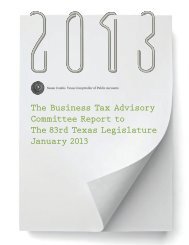Contracts Management Guide - Texas Comptroller of Public Accounts
Contracts Management Guide - Texas Comptroller of Public Accounts
Contracts Management Guide - Texas Comptroller of Public Accounts
Create successful ePaper yourself
Turn your PDF publications into a flip-book with our unique Google optimized e-Paper software.
In order to determine what constitutes scope changes to advertised specifications, the significant question is whether<br />
the changes are material or substantial.<br />
Material or substantial changes are not measured by the number <strong>of</strong> changes made to the original specifications.<br />
Rather, they are measured by whether the extent <strong>of</strong> the changes would so substantially alter the original specifications<br />
that not re-advertising the revised specifications would deny a procurement opportunity to someone who would have<br />
been able to respond to the revised specifications. If much is revised, then those changes will be treated as a new<br />
proposal. A new solicitation is needed to ensure compliance with the bidding statutes. lxxv<br />
Although limited, there are several decisions that explain the principles.<br />
In one situation, a Commissioners Court awarded a construction contract. After awarding the contract, it was decided<br />
that a tile floor had to be excluded from the original plans. Since the advertised specifications formed the basis for the<br />
contract award, the Attorney General Opinion determined that all bidders would need to be given an opportunity to<br />
bid on the new specifications. No material or substantial change in the terms could be allowed without that<br />
opportunity. lxxvi<br />
In a different procurement, a City advertised for competitive bids on a treatment plant contract. When each <strong>of</strong> the five<br />
bids submitted exceeded money available for the project, the City made more than thirty-five (35) changes to the<br />
original plans. But the City only presented these revisions to the original low bidder, who submitted a revised bid—<br />
one much lower than its original one. It was determined in the Attorney General Opinion that these changes were<br />
substantial enough that the revised plans constituted new specifications requiring new bids. Just because a company is<br />
the lowest bidder on one set <strong>of</strong> specifications does not mean it will be the lowest bidder when the specifications<br />
change. lxxvii<br />
Another example involved a County that received bids exceeding its project funds. Initially only negotiating with the<br />
lowest bidder for a proposal to reduce scope, it later apparently realized its error and the proposal was rejected. When<br />
the lowest bidder appealed his loss in the trial Court, the appellate Court upheld the trial Court’s judgment. It<br />
emphasized that the competitive bidding process is designed to stimulate competition, and that compliance with<br />
statutory bidding requirements is mandatory. lxxviii<br />
As a general rule, whether a change is material or substantial is a fact question. What is fundamental is the principle<br />
that materially changing solicitation specifications after receipt <strong>of</strong> responses denies an opportunity for others to<br />
participate in the solicitation. Therefore, any contract amendments are required to be within the scope <strong>of</strong> the original<br />
contract and the competitive process underlying the original contract.<br />
It is important to remember that application <strong>of</strong> the above principles will depend upon your particular fact situation,<br />
and may not apply to the specifics <strong>of</strong> a request for proposal or request for <strong>of</strong>fer. Always consult with your legal staff<br />
members before proceeding.<br />
Administrative Changes<br />
These are changes that are within the scope <strong>of</strong> the contract and do not affect or alter the rights <strong>of</strong> the parties. These<br />
changes are typically executed via a unilateral amendment. Examples <strong>of</strong> administrative changes include:<br />
• Changes in billing instructions or address;<br />
• Corrections <strong>of</strong> typographical errors not affecting the substance <strong>of</strong> the contract;<br />
• Changes as permitted by the specific contract language.<br />
• Changes in agency personnel assigned to the contract.<br />
71

















